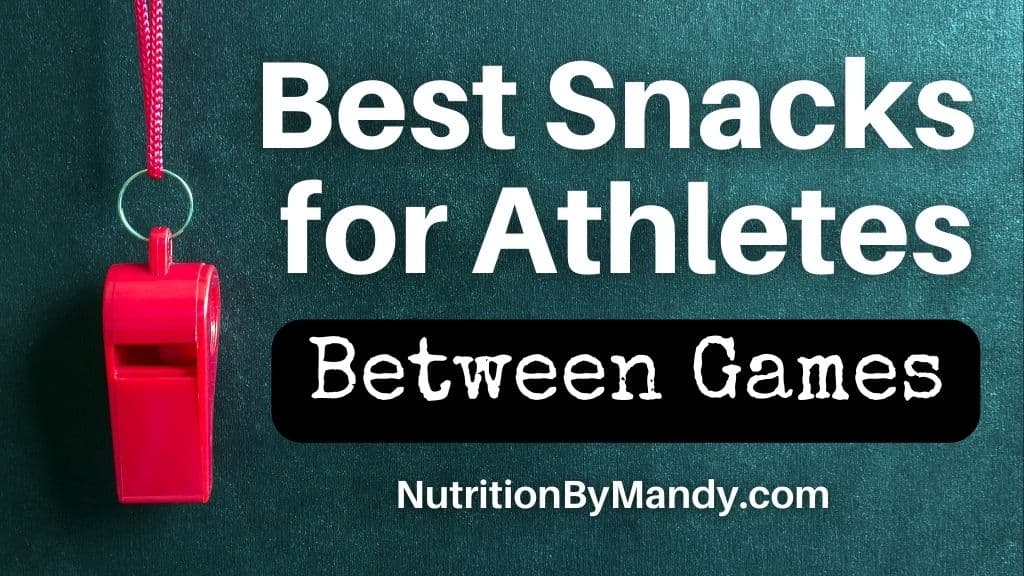Last Updated on April 29, 2025 by Mandy Tyler, M.Ed., RD, CSSD, LD
Best Snacks for Athletes Between Games
It can be helpful for athletes to know what snacks to pack for a full-day competition. Having the right foods and beverages available can help ensure athletes are fueled to compete through the final buzzer.
Let’s take a look at the best snacks for athletes between games to meet their sports nutrition needs.
Pre-Game Meal: Nutrition Foundation for the Day
Prior to planning snacks for game day, athletes will want to make sure they start the day off with a well-planned pre-game meal.
The pre-game meal should include a good source of carbohydrates and a moderate amount of lean protein. In addition, the meal should be relatively low in fat and fiber.
The pre-game meal will provide the nutrition foundation needed to support an athlete’s upcoming day of competition.
Example pre-game meals may include:
- Fruit smoothie, bagel with nut butter
- Scrambled eggs, pancakes, fresh sliced fruit
- Pasta with tomato sauce, grilled chicken, vegetables, breadsticks
- Roasted salmon filet, steamed rice, fresh mixed berries, dinner roll
- Turkey sub sandwich, pretzels, apple slices, sports drink
Best Snacks for Athletes Between Games
When planning snacks for a tournament or day of competition, it is important to consider how much time there will be between games.
If there is limited time between games (1-2 hours), athletes should focus on consuming carbohydrates for energy and rehydrating with fluids and electrolytes.
Carbohydrate-Rich Snacks Between Games
Carbohydrates provide athletes with the energy needed to perform at their best.
During activity, athletes deplete their carbohydrate stores. Thus, replacing these stores between games is important.
Quick high-carb snacks athletes can enjoy between games include:
- Fresh fruit: Bananas, grapes, apples, oranges
- Dried fruit: Raisins, cranberries, pineapple, mango, papaya
- Applesauce squeeze pouches
- Fruit cups (in natural juices, not heavy syrup)
- Granola bars, fig bars, breakfast bars
- Pretzels, pita chips, snack crackers
- Mini-bagels, rolls, dry cereal
- Animal crackers, graham crackers
- Sports drinks, gels, or chews

Snacks Between Games: Mini-Meals
When athletes have more time between games, they can plan on eating a “mini-meal.”
To build a mini-meal, I encourage athletes to choose a balanced snack that provides a good source of carbohydrates along with a source of protein. Similar to the pre-game meal, the snack between games should be low in fat and fiber.
Athletes should drink water or a sports drink with their mini-meal to support their hydration needs.
Mini-Meal Snack Ideas for Between Games
Mini-meal snacks that athletes can enjoy between games include:
- Peanut butter and jelly sandwich, banana
- Turkey wrap, pretzels, orange wedges
- String cheese, crackers, sliced ham, fruit cup (in natural juices)
- Breakfast bars, apple slices, and nut butter
- Greek yogurt, berries, granola
- Jerky, granola bars, sliced melon
- Pita chips, hummus, grapes
- Trail mix (made with pretzels, dried fruit, breakfast cereal, nuts)

Rehydrating Between Games
Dehydration can negatively impact sports performance and increase the risk of heat illnesses (1). Therefore, it is important for athletes to make rehydrating between games a top priority.
During activity, athletes sweat in order to remove heat from their bodies. When athletes sweat, they lose both fluid and electrolytes. The main electrolyte lost in sweat is sodium.
When focusing on rehydrating between games, it is important to consume both fluid and sodium (1).

What About Sports Drinks Between Games?
Consuming a sports drink between games can help athletes replace both fluid and electrolyte losses.
In addition, drinking a sports drink that contains carbohydrates can assist with providing energy for the upcoming game.
When athletes are competing in a hot and humid environment, a sports drink can be particularly beneficial in helping to replace fluid and electrolyte losses.
If athletes rehydrate with water between games, choosing snacks that contain sodium, such as pretzels or pita chips, can help with replacing sodium lost in sweat.
Sodium also helps stimulate thirst (1), thus encouraging athletes to drink fluid between games as well.
Recovery Nutrition following Games
Following the last game of the day, athletes should focus on recovery nutrition.
Recovery nutrition is particularly important if the athlete plans to compete again the next day.
There are three key areas for athletes to focus on when it comes to recovery nutrition.
- Fluid and Electrolytes: Rehydrate to replace fluid and electrolytes lost in sweat
- Carbohydrates: Refill energy stores used during the activity
- Protein: Build and repair muscles

Recovery Nutrition Snack Ideas
Easy post-game snack ideas that can help athletes meet their recovery nutrition needs include:
- Low-fat chocolate milk with granola bars
- Peanut butter and jelly sandwich with low-fat milk
- Tuna, crackers, orange wedges, sports drink
- Ham and cheese wrap, pretzels, grapes, 100% fruit juice
- Trail mix (made with pretzels, dried fruit, breakfast cereal, nuts), sports drink
- Breakfast bars with nut butter, banana, low-fat milk
- Sports bar with sports drink
Athletes should then follow-up the recovery nutrition snack with a well-planned post-game meal.
Why is Chocolate Milk Recommended Following a Game?
Chocolate milk is commonly recommended as a recovery drink for athletes to drink following a game.
The reason is chocolate milk is recommended is because it checks all three boxes when it comes to recovery nutrition.
Chocolate milk is 90% water, helping athletes with rehydrating following a game. In addition, a 1-cup serving of chocolate milk provides 26 grams of carbohydrates and 8 grams of complete protein (2).
Thus, chocolate milk helps support athletes with meeting their fluid, protein, and carbohydrate needs following a game.
Food Safety Reminders for Between Game Snacks
When packing your snacks for the day, remember the importance of food safety.
Washing hands prior to eating should be a top priority for athletes. If athletes do not have access to soap and water to wash their hands, the Centers for Disease Control and Prevention recommends using an alcohol-based hand sanitizer.
Food Temperature Control
Holding foods at the correct temperature is another important aspect of food safety.
The Centers for Disease Control and Prevention defines the temperature range between 40°F and 140°F, as the “Danger Zone” in which bacteria can rapidly grow.
Athletes will want to make sure perishable food is stored in an ice chest (<40°F) throughout the day.
This includes items such as:
- Milk, yogurt, cheese
- Deli meat, chicken, hard-boiled eggs
- Mayonnaise or products containing mayonnaise (tuna, chicken, or egg salad, sandwiches with mayonnaise)
- Produce that has been cut or sliced (i.e., sliced melon)
Food should not be left sitting out at room temperature (in the temperature “Danger Zone”) for over 2 hours. This time frame decreases to 1 hour if the temperature exceeds 90 °F outside (3).
Food left out over these time limits should be thrown away to reduce the risk of getting a foodborne illness.

Snacks for Athletes Between Games
You are now set with a variety of ideas for snacks that athletes can eat between games to ensure they are fueled to perform at their best.
Athletes should remember to start the day with a well-planned pre-game meal and pack a variety of snacks to keep them fueled all day long.
For additional sports nutrition information, make sure to check out my blog on nutrition tips for teen athletes.
Join the Nutrition By Mandy Email List & Get a Free Athlete’s Grocery List
Click HERE to join the Nutrition By Mandy e-mail list. When you join you will receive a free athlete’s grocery list to print and take with you to the store.
About the Author
Mandy Tyler is a Sports Dietitian Nutritionist in the San Antonio, TX area. She is a Registered and Licensed Dietitian, a Board-Certified Specialist in Sports Dietetics, a Licensed Athletic Trainer, and is a Certified Exercise Physiologist through the American College of Sports Medicine. Mandy has experience working with athletes at the high school, collegiate, and professional levels. She believes the key to reaching one’s full potential, both in everyday life and in sports performance, relies on a healthy nutritional foundation.

If you are looking to take your performance to the next level, make sure to check out my new Sports Nutrition Game Day Guide. This downloadable guide is written to help athletes develop an individualized plan to achieve peak performance on game day.





